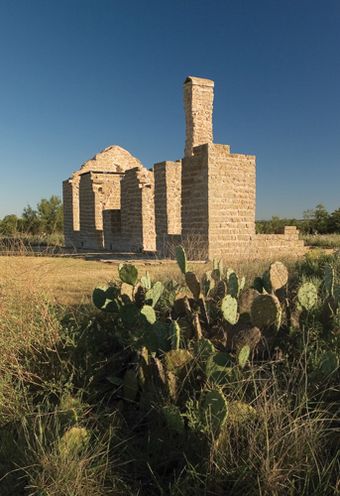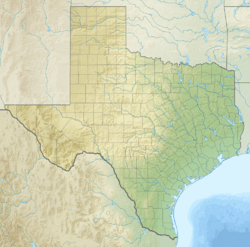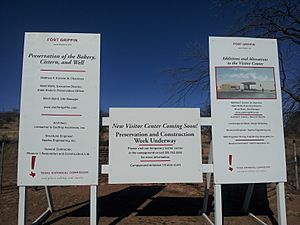Fort Griffin facts for kids
|
Fort Griffin
|
|

Fort Griffin State Historic Site in 2009
|
|
| Nearest city | Albany, Texas |
|---|---|
| Area | 204.6 acres (82.8 ha) |
| Built | 1867 |
| NRHP reference No. | 71000962 |
Quick facts for kids Significant dates |
|
| Added to NRHP | March 11, 1971 |
Fort Griffin is a special historical place in Texas. It used to be a United States Army fort built way back on July 31, 1867. Soldiers from the Sixth Cavalry set it up to protect settlers, who were people moving into the area, from raids by Native American groups like the Comanche and Kiowa.
The fort was first called Camp Wilson, named after a lieutenant who had recently passed away. Later, it was renamed Fort Griffin to honor Charles Griffin, a general from the American Civil War. He was in charge of Texas for a while after the war. Today, Fort Griffin is known as the Fort Griffin State Historic Site, where you can learn all about its past.
Fort Griffin was part of a big network of forts that protected the frontier in the southwestern United States. Other important forts in Texas included Richardson, Concho, Davis, and McKavett. There was also Fort Sill in Oklahoma. These forts helped keep the peace and supported people moving west.
Contents
History of Fort Griffin
Building the Fort
When Fort Griffin was first built, the plan was to make strong stone buildings. However, for the 14 years it was active, the fort mostly looked like a temporary camp. Soldiers built log houses, tents, and simple wooden structures for shelter. It was hard to find building materials and money, and the soldiers were always busy with their duties. Because of this, only six of the more than 90 buildings at the fort were made completely of stone.
Defending the Frontier
Even though a lot of time was spent building and keeping up the fort, the main job of the soldiers was to defend and patrol the frontier. For example, Captain Adna Chaffee led a successful fight against the Comanche in March 1868. More soldiers, from the 17th Infantry, arrived in June 1868 to help out.
A Busy Stop for Travelers
Fort Griffin became a starting point for many trips heading west. A lively town, sometimes called "the Flat," grew up just north of the fort by 1870. This town was a popular stop for wagon trains and soldiers. It had places where people could relax and socialize after a long day.
The Flat also became a key stop for cattle drives heading north to Dodge City, Kansas. During this time, many famous people from the Old West visited or lived there. These included Wyatt Earp, Doc Holliday, and Pat Garrett, who was known for catching the outlaw Billy the Kid. Brothers Bat and Jim Masterson also passed through. John Selman, who later became known for catching outlaw John Wesley Hardin, worked as a deputy sheriff in the area.
In May 1871, important leaders like General William Tecumseh Sherman visited the fort.
The Fort's Closing
After the Red River War in 1874, the threat from the Comanche and Kiowa groups became much smaller. More and more ranchers and farmers moved into the area, and Fort Griffin was no longer on the edge of the frontier. On May 31, 1879, the last soldiers lowered the flag for the final time and left the fort.
Gallery
-
Clear Fork of the Brazos River looking from the top of "Government Hill"
Preserving Fort Griffin's History
Today, Fort Griffin is a Texas State Historic Site. On January 1, 2008, the Texas Historical Commission took over its care. They work to preserve the fort and teach people about its history.
Every year, during the last two weekends of June, the town of Albany puts on a Western musical show called the Fort Griffin Fandangle. It's held in the Prairie Theater and has been going on since 1938, making it "Texas' Oldest Outdoor Musical." The show changes its story each year. Also, a special herd of Texas Longhorn cattle, which are part of the official state herd, lives at Fort Griffin.
Climate at Fort Griffin
The weather in this area has hot and humid summers. Winters are usually mild to cool. According to climate experts, Fort Griffin has a humid subtropical climate. This means it gets a good amount of rain and has warm temperatures for most of the year.
See also
 In Spanish: Fort Griffin para niños
In Spanish: Fort Griffin para niños
 | Janet Taylor Pickett |
 | Synthia Saint James |
 | Howardena Pindell |
 | Faith Ringgold |







